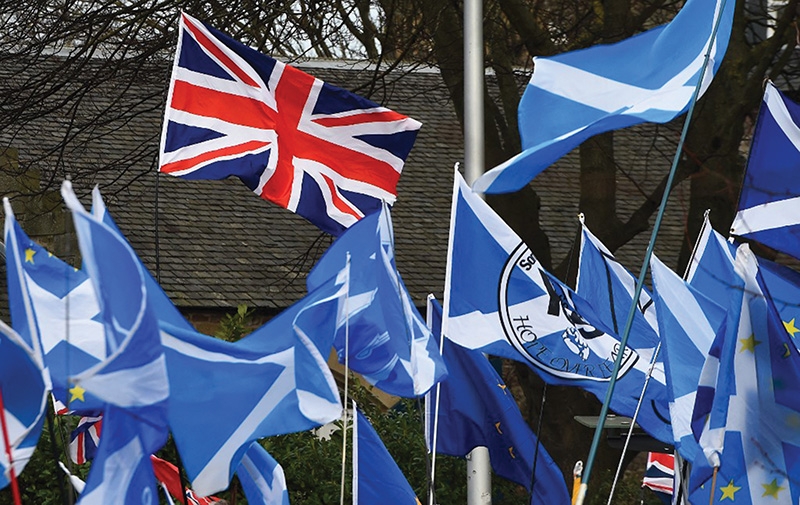Bumps and benefits for citizens in post-Brexit UK
 |
| It will be at least a year until a true picture is painted of how the UK will operate outside the European Union Photo: AFP |
As we know, on January 31, the United Kingdom officially left the European Union, after 47 years of being a key member of this bloc, a process which was called Brexit. No-one can predict for sure what the consequences will be of this historic decision. Within the UK, the average ratio of supporters and opponents of this decision was almost equal, 52 to 48 per cent in favour, and uneven across regions. Each party, meanwhile, had good reasons to defend their opinions enthusiastically.
 |
| Dr. Cuong Phu Nguyen, architect in the UK |
Whether for or against, however, Brexit now has happened. After more than three years of negotiations, the common aspiration among those in power was to conclude the lengthy and divisive process. Prime Minister Boris Johnson succeeded in breaking the deadlock in withdrawal negotiations with the EU, and overcome internal inconsistencies within the British Parliament to deliver this extremely difficult task.
Recalling the above helps to understand Brexit’s context, its complexity, and its multi-faceted aspects. This, hopefully, can help us make objective judgments and valid predictions on the impact of Brexit.
Although the UK and EU have now divorced, the relationship between them will continue to be strong and deep because of their decades of relationship and because both sides need each other. In all fields, from politics and diplomacy, security and the military, to anti-terrorism and environmental protection, the UK and the EU will still work closely together. However, there will be changes after the two sides reach an official agreement to shape their new relationship after the transitional period expires on December 31, 2020.
During this period, nothing will immediately change for UK citizens living in the European Union and EU citizens in the UK, as the UK will still be bound by EU laws. There are approximately 1.3 million British citizens living and working in the EU, and over 3.5 million EU citizens are in the UK.
Regulation reshuffle
The freedom of movement rule, which allows EU citizens the right to live and work in the UK and gives British citizens the right to do the same in EU countries, will continue until the end of 2020. After that, the UK government is planning to pass a law to end EU citizens’ freedom of movement, which means they will need a visa to work or live in the UK for the long term.
British immigration laws are expected to change. It is worth noting that one of the main reasons for Brexit was to control and reduce the overall number of immigrants, especially low-skilled ones. At the same time, a common aspiration is to attract truly talented people of good character, and those useful to the UK to help the economy and country thrive. By doing so, the government wants to break away from a reliance on cheap labour while boosting high skills, technology, and innovation, to benefit the UK for the future.
Under a possible points-based system, the government estimates there could be a cut of tens of thousands of unskilled EU migrants coming to the UK each year, while it hopes for an increase of 65,000 skilled workers from around the world. Other details such as new charges for EU students to attend British universities are also set to be discussed as part of trade deal negotiations.
Another potential change after Brexit is that from next year, the UK government will cut the minimum salary for migrant workers, to allow the National Health Service and schools to continue to recruit staff. New migrants will also be able to earn points for speaking good English or having an outstanding educational background. Even if their job offers less than the minimum salary threshold, but in a sector listed as having a skills shortage, they will be awarded double points.
I think the impact of Brexit will be both positive and negative, depending on the situation and group of people. For example, for Vietnamese people with EU nationalities, such as France, Poland, and Hungary, nothing will change at first. They will still have the option to leave the UK or settle permanently. Nevertheless, those who only have Vietnamese passports but are dependants of a spouse who is a EU citizen may be affected by the issue when the right to come in with this spouse no longer exists.
Another group that may be affected by Brexit is foreigners applying for UK asylum. In the past, they used to rely on EU human rights laws to stay. Now the UK government is no longer bound by EU laws, it will eventually apply its own rules. Applying for asylum may be much harder than before because it will no longer be possible for people to appeal against the decision of the British courts to European courts.
Although there are many advantages of having freedom of movement and trade between EU countries, in the past it has partly contributed to the problem of foreigners, illegally crossing into the UK on cargo trucks to work illegally or grow cannabis, as the recent tragic story of our 39 fellow countrymen demonstrated. Now, I think the UK will be able to better control its borders and concentrate resources to deal more effectively with this problem.
Grabbing the positives
The most obvious beneficiary group from Brexit, in my opinion, are Vietnamese students and researchers coming to the UK to study and work. Before Brexit, the UK government created many policy barriers that affected non-EU international students who wanted to stay to work here after their studies. Now, if there is to be a reduction in the number of immigrants from the EU, students from the continent might no longer be entitled to preferential tuition fees, or European qualifications might not be automatically recognised in the UK as before, increasing the demand for the British labour market.
At the same time, the UK government has recently updated its policy on a post-study work visa, to allow international students to stay up to two years after their studies to apply for jobs in the country. This has offered a great opportunity for international students, including Vietnamese, to enter the UK for studies and employment.
A post-Brexit strategy of the UK government is to strengthen its position as a global power in research and development, innovation, and its education system. This will surely be a good sign for Vietnamese students and help strengthen the ongoing co-operation of researchers and scientists of the two countries.
As for Vietnamese people who work or run businesses in the UK, the direct and indirect impact of Brexit is still unclear, at least in the immediate future. This group is directly affected by the health of the economy, which in general has not shown a post-Brexit recession shock as some early pessimistic scenarios suggested. In contrast, the real estate market in particular seems to be enjoying a Brexit bump.
The value of an average home in the UK increased by £4,000 ($5,150) last December – the largest monthly increase since 2007, pushing the annual rise to 4 per cent. This trend is continuing and could still be an opportunity for investors from Vietnam.
In the construction industry, there is also no sign yet of stalled projects due to Brexit. Of course, everything is still ahead and the risks of the economy falling back to recession cannot be eliminated. All we can say is wait and see, at least until trade agreements between the UK and others such as the EU, the United States, and even Vietnam are signed. Hoping for the best and planning for the worst remains relevant in this case.
I do hope that Brexit will bring great new opportunities for the Vietnamese community in the UK in particular, and aids co-operation for the development of the two countries in general.
This year also marks the 10th anniversary of the UK-Vietnam strategic partnership. As highlighted by Gareth Ward, the British Ambassador to Vietnam, in a recent article: “Vietnam is an important partner of the UK and has a faster growth rate than many other countries in the ASEAN. We look forward to continuing to support Vietnam to become the gateway of the ASEAN, strengthening our relationship and at the same time contributing to the process of building a safer and more sustainable world”.
What the stars mean:
★ Poor ★ ★ Promising ★★★ Good ★★★★ Very good ★★★★★ Exceptional
Related Contents
Latest News
More News
- IP alterations shape asset strategies for local investors (January 22, 2026 | 10:00)
- 14th National Party Congress: Vietnam - positive factor for peace, sustainable development (January 22, 2026 | 09:46)
- Japanese legislator confident in CPV's role in advancing Vietnam’s growth (January 22, 2026 | 09:30)
- 14th National Party Congress: France-based scholar singles out institutional reform as key breakthrough (January 21, 2026 | 09:59)
- 14th National Party Congress: Promoting OV's role in driving sustainable development (January 20, 2026 | 09:31)
- 14th National Party Congress affirms Party’s leadership role, Vietnam’s right to self-determined development (January 20, 2026 | 09:27)
- Direction ahead for low-carbon development finance in Vietnam (January 14, 2026 | 09:58)
- Vietnam opens arms wide to talent with high-tech nous (December 23, 2025 | 09:00)
- Why global standards matter in digital world (December 18, 2025 | 15:42)
- Opportunities reshaped by disciplined capital aspects (December 08, 2025 | 10:05)

 Tag:
Tag:




















 Mobile Version
Mobile Version